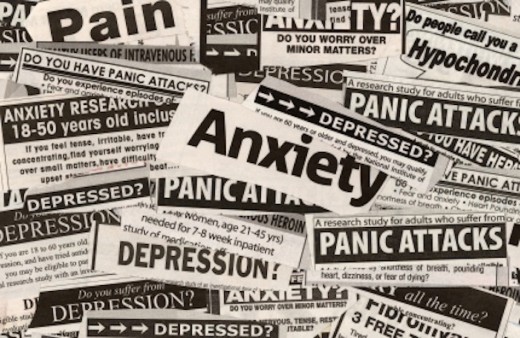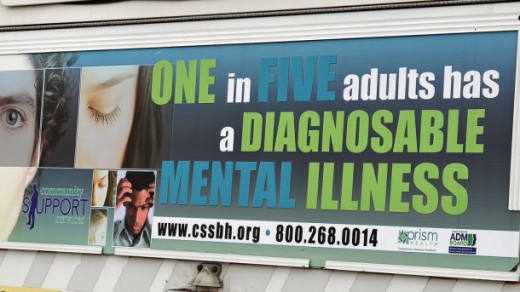Mental Illness and Trials of the Caregiver
Mental Illness


When a Dear One Suffers
What is life like when a spouse, a child, or a parent becomes mentally ill? Mental disorders range from mild to severe, and regardless of the type of disorder, the challenges of living with, and caring for, the dear one become the daily reality for many who often find themselves lost in the world, somewhere between sanity and insanity, coping as best as they can. As a spouse of a mentally ill person, as a parent, a child or a sibling - the world can crumble and take you down the treacherous road of isolation and despair. You love this person, you feel responsible for him or her, but it tears you apart as you try to make sense of what it means for you, the normal and rational being. Should you feel guilty? Definitely not! But often, you find yourself wanting to escape, and that generates feelings of guilt that can further diminish your strength in coping.
This article is geared towards finding help and coping skills because sadly, many mental illnesses are merely manageable, not entirely curable. .
A Personal Journey
It has taken me decades to find the courage to talk about my own personal journey through my mother's mental illness. Dealing with it day to day was hard enough. It was a different time and place, and people did not expose a mentally ill relative's condition to the world. The stigma, the shame, the confusion not only affected the patient but also the family. It took us all from the normal social existence into the darkness of oblivion where we hid ourselves, not just from the outside world, but also from each other and ourselves. We were knit together as a family, close in the crisis, yet becoming lonely in our spirits. There was crushing loneliness in the knowledge that this was going to be a long, winding road taking us all through labyrinths of my mother's mind that lived torments that only it knew, but the horror of those torments was felt by all of us.
My mother - a woman of tremendous courage and robust in health, who prided herself on never even catching a cold, was an epitome of sacrifice and service. My parents loved each other and my father doted on her. She was the strong one, the resilient one, the one who rose at dawn and went to bed only after all of her family, husband and 3 children had been dutifully taken care of and tended to. We were a middle-class family with my father being the sole breadwinner. My mother dedicated herself to our physical, emotional and educational needs, ensuring each one of us received the best our means would allow. Life was stressful as those means were limited, yet still reflected the energy and vitality of a purposeful life, but what was to follow, unbeknownst at the time, would rob us of all peace and become a hell in which stress can only be defined as a particle. We were always surrounded by relatives and friends of the family who would gather every weekend to feast upon my mother's deliciously prepared meals. We would play games and life was normal.
Night Falls Upon Our Lives
To cut a long story short, the sudden and catastrophic change that occurred one night, when I was ten years old, changed our lives forever. It happened, or seemed to happen, overnight, although subsequently we realized signs had been there before. Having concluded our day, we were handed our non-alcoholic nightcaps by my mother, which was a warm cup of milk for each before bedtime. Minutes later, my father shrieked and called out for help.
She lay on the floor, in a delirium, in an episode of severe hallucinations that would rock the rest of our lives at home, but most of all the life of my father for the next thirty years. She was diagnosed with manic depressive psychosis in the days to follow. It ended with her death at the age of 76, having also suffered cancer and Parkinson's disease along the way.
Torn Apart, Yet Clinging Together
As if a hurricane had struck and washed away all our precious belongings, we were tossed about as a family in the flood, each searching for the other in the perilous waters, held together by love, but torn apart by the storm. We clung to whatever of the other we could find when we found it and hanging on with dear life to our own sanity.
Isolation
After a period of initial shock came despair and increasing withdrawal from the world outside. I was young and couldn't explain why school seemed so distant, so meaningless when I could not play with my friends as I had done before, I couldn't even talk to them as I had done before. Gone was the frivolity and frolic of childhood and I was forced to grow up long before my time. I could no longer invite friends over because home had become a cauldron of some vicious brew that carried its toxic fumes into its very walls. The woman I loved as my mother had become unrecognizable. I searched for her every time I looked at her, and could only discern her when I could see past the illness into the very depths of her eyes. There it was that I still saw the love, but the anchor and guidance, the rock that supported me, was gone. Besides the really close relatives and a few friends, our party days were over. We drifted into social oblivion and the world soon forgot us.
Don't Lose Sight of Your Silver Lining

Finding Help for YOU, the Co-Sufferer
If you find yourself in this situation, you need as much help as the loved one you are taking care of. Whether it is a child or an adult you are responsible for, it is vital that you seek ways to alleviate the feelings of anxiety, loneliness and guilt that come with this burden.
- If you lose your temper, feel angry, resentful or overwhelmed and blow your fuse from time to time, forgive yourself! You are human. Do not carry guilt in your heart.
- Find a therapist you can trust, just for yourself. Talk therapy helps you gain control over your emotions while you are dealing with the emotions of your relative. You will not be judged and you will know everything you tell your therapist is confidential.
- If you have a family member or close friend who can occasionally step in to relieve you for a few hours, accept their help. Spend that time doing something for yourself, something you love to do.
- Contact organizations that can address your needs as caregiver and connect you with those who can support you.
- If you are far from support groups or friends, the online world has a place for you to write, blog or share your experience with others who are just as compromised as you. Start your own blog or join one. Expressing feelings in any way at all is crucial to your own mental health.
- Be loving to yourself. Know you are doing your best and none of what is happening is your fault.
Other Helpful Resources
There was very little help or support available in the time before the wonder web came into existence. With cyber resources becoming increasingly prolific, there is always a way to connect with support groups and even find local ones that cannot help alter the course of the illness of the person you are caring for, but can help YOU gain better control over the emotional turmoil you are experiencing, to navigate through the conflicts you face.
http://psychcentral.com/lib/helping-a-family-member-with-a-mental-disorder/000120








